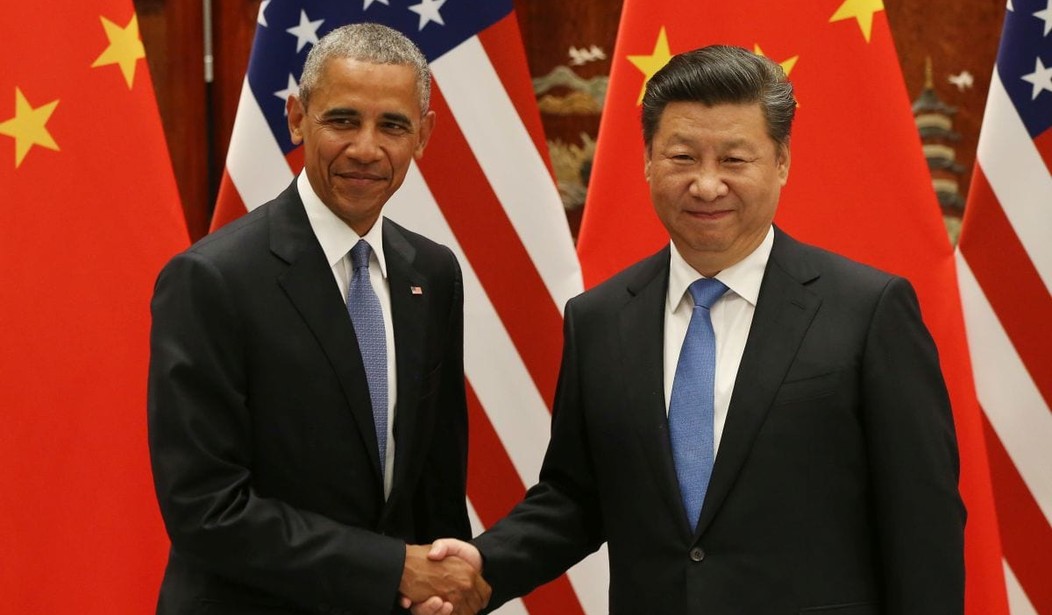President Barack Obama and Chinese President Xi Jinping announced that both countries had ratified the Paris Climate Treaty in advance of the G-20 summit in Hangzhou.
But there was a telling difference in how that ratification was achieved. The Chinese Communist legislature voted earlier to approve ratification. President Obama simply waved his magic scepter and willed the treaty’s ratification into existence without getting the advice and consent of the Senate as required by the Constitution.
Granted, the Chinese legislature is hardly the most democratic body in the world, and pretty much rubber stamps what President Xi Jinping proposes.
But did you ever think you’d see the day when a Communist government would teach a lesson in democracy to the United States?
“Some day we may see this as the moment when we decided to save our planet,” Mr. Obama said. “History will judge today’s efforts as pivotal.”
Separately, Mr. Obama and Mr. Xi agreed on a side deal aimed at curbing other pollutants in the U.S. and China. They committed to “freeze” the production of hydrofluorocarbons, the chemicals often used in air conditioning and refrigeration, and cut aviation emissions by an unspecified date, possibly as early as 2021.
The U.N. climate-change pact cannot take effect until 55 nations representing 55 percent of worldwide carbon emissions formally ratify the agreement. The U.S. and China, the world’s two largest emitters, represent about 38 percent of total global emissions.
With the formal entry of Washington and Beijing into the deal, the agreement now has been joined by 25 nations representing slightly more than 40 percent of total emissions. Mr. Obama is hoping to push the agreement to completion by the end of this year as one of his prime legacy goals.
White House climate adviser Brian Deese said Saturday’s action is intended to “provide confidence to other countries” to join the pact. He said there are commitments from more than 55 nations, including Brazil, Argentina and South Korea.
Republican presidential nominee Donald Trump has said he would cancel the agreement if elected. Mr. Deese said despite opposition by Mr. Trump and by many Republicans in Congress, there is “broad support” among the public and the business community for an international climate agreement.
“We’re quite confident the United States will continue to be a part of this agreement going forward,” he said.
Environmental groups hailed the move. Greenpeace East Asia’s senior climate policy adviser Li Shuo said “political ambition must keep up with rising sea levels faced by vulnerable communities around the world.”
The agreement forged by 195 nations last December in Paris sets non-binding targets for the reduction of carbon emissions that most scientists blame for rising temperatures and sea levels.
The Obama administration is not calling the pact a treaty, thereby avoiding the step of taking it to the Senate for a ratification vote — and likely rejection.
The White House argument for bypassing the Senate is that the treaty is an “executive agreement” that doesn’t need a ratification vote.
If that were true, why did Xi feel the need to get his legislature’s approval? And why are many other countries having to ask their legislatures for approval before ratification?
The president is a lazy coward. He’s lazy because, as usual, he refuses to do the hard, slogging work of trying to convince Congress to follow his lead. He simply announces that it’s impossible and pulls out his pen. And he’s a coward because he fears Senate rejection of his “climate legacy.”
This treaty is likely to cost the U.S. economy trillions of dollars in lost growth and hundreds of thousands of lost jobs. And yet, the people’s representatives have no say in whether the United States should go along with it?
This is a new low for the president in making an end run around Congress to get his way. With more than four months to go before we see the back of him, we can expect the bar to be lowered even further as the president continues to shred the Constitution and vastly expand executive power.










Join the conversation as a VIP Member